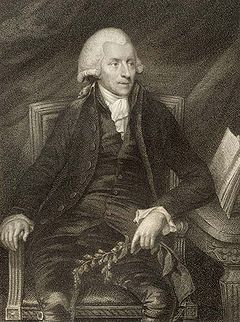- William Withering
-
William Withering 
William Withering, por Carl Frederik von BredaNacimiento 1741
Willington, ShropshireFallecimiento 1799
BirminghamResidencia Gran Bretaña Nacionalidad británico Campo médico, geólogo, químico, botánico Conocido por descubridor de la digitalis Cónyuge Helena Cookes William Withering ( * 17 de marzo 1741 en Willington, Shropshire - 6 de octubre 1799 en Birmingham) fue un médico, geólogo, químico, y botánico británico.
Contenido
Biografía
Withering estudió Medicina en la Universidad de Edimburgo, y trabajó como médico desde 1779 en el Birmingham General Hospital. Se cuenta que un paciente que tenía Withering con un corazón débil que no mejoraba, sin embargo este paciente que tomó un preparado de plantas, remedio tradicional de la zona, mejoró. Withering investigó la causa de esta mejoría y descubrió que la sustancia activa responsable se encontraba en las hojas de la Dedalera (Digitalis purpurea).
La sustancia activa es actualmente conocida como digitalis, derivado del nombre científico de la planta. En 1785, Withering publicó un trabajo "The Foxglove and some of its Medical Uses", que contiene informes sobre pruebas clínicas y notas sobre la toxicidad de la digitalis.[1]
Withering vivió en Edgbaston Hall (actualmente un club de golf y reserva natural)[2] , en Birmingham, Inglaterra, y fue uno de los miembros de la "Lunar Society".
Además de su actividad médica Withering publicó un libro sobre la Flora Británica, que se imprimió en varias ediciones. Además publicó un trabajo de clasificación de Hongos pionero en su tiempo.
Está enterrado en la iglesia vieja de "Edgbaston", próxima a "hall". Su lápida, que actualmente se ha trasladado al interior de la iglesia, tiene dedaleras grabadas en la parte superior, para conmemorar su descubrimiento. También es recordado por las "Piedras de la Luna" de la "Lunar Society Moonstones", también en Birmingham.
Obras
Esta lista fue extraída de Sheldon, 2004:[3]
- 1766 Dissertation on angina gangrenosaspastic
- 1773 "Experiments on different kinds of Marle found in Staffordshire" Phil Trans. 63: 161-2
- 1776 "A botanical arrangement of all the vegetables growing in Great Britain..." (dos vols.) Publ Swinney, Londres
- 1779 "An account of the scarlet fever and sore throat, or scarlatina; particularly as it appeared at Birmingham in the year 1778" Publ Cadell Londres
- 1782 "An analysis of two mineral substance, vz. the Rowley rag-styone and the toad stone" Phil Trans 72: 327-36
- 1783 "Outlines of mineralogy" Publ Cadell, Londres (traducción del original en latín de Bergmann)
- 1784 "Experiments and observations on the terra ponderosa" Phil trans 74: 293-311
- 1785 "An account of the foxglove and some of its medical uses; with practical remarks on the dropsy, and some other diseases" Publ Swinney, Birmingham
- 1785 "The Foxglove and some of its Medical Uses"
- 1787 "A botanical arrangement of British plants..." 2ª ed. Publ Swinney, Londres
- 1788 Letter to Joseph Priestley on the principle of acidity, the decomposition of water. Phil Trans 78: 319-330
- 1790 "An account of some extraordinary effects of lightning" Phil Trans 80: 293-5
- 1793 "An account of the scarlet fever and sore throat..." 2ª ed Publ Robinson, Londres
- 1793 "A chemical analysis of waters at Caldas" extraídp de Actas da Academica real das Sciencias
- 1794 "A new method for preserving fungi, ascertained by chymical experiments" Trans Linnean Soc 2: 263-6
- 1795 "Analyse chimica da aqua das Caldas da Rainha" Lisboa (un análisis químico del agua de Caldas da Rainha)
- 1796 "Observations on the pneumatic medicine" Ann Med 1: 392-3
- 1796 "An arrangement of British plants..." 3ª ed. Publ Swinney, Londres
- 1799 "An account of a convenient method of inhaling the vapour of volatile substances" Ann Med 3: 47-51
- "British Flora",
Abreviatura
La abreviatura With. se emplea para indicar a William Withering como autoridad en la descripción y clasificación científica de los vegetales. (Ver listado de especies descritas por este autor en IPNI)
Referencias
- ↑ Haughton, Claire (1980). Green Immigrants. New York: Harcourt, Brace, Jovanovich. pp. 133–134. ISBN 0156364921.
- ↑ "William Withering (1741-1799): A Birmingham Lunatic" Proc R Coll Physicians Edinb 2001; 31:77-83. visto 28 de junio de 2009
- ↑ Sheldon, Peter (2004). The Life and Times of William Withering: His Work, His Legacy'(which was a lot)'. ISBN 1-85858-240-7
- William Withering Junior (1822). Miscellaneous Tracts. Dos volúmenes: una memoria por el hijo de Withering, y una colección de muchos de sus escritos
- Louis H Roddis (1936). William Withering - The Introduction of Digitalis into Clinical Practice. Breve biografía
- TW Peck and KD Wilkinson (1950). William Withering of Birmingham. Biografía detallada
- Ronald T Mann (1985). William Withering and the Foxglove. Una reseña de "Osler bequest": colección de cartas de Withering
- J K Aronson (1985). An Account of the Foxglove and its Medical Uses 1785-1985. Reseña anotada de la obra de Withering, con un análisis moderno de los casos descriptos
- Jenny Uglow (2002). The Lunar Men. ISBN 0-571-19647-0. Una reseña sobre los miembros de la Lunar Society, sus esfuerzos, y relaciones
Enlaces externos
- «William Withering», Índice Internacional de Nombres de las Plantas (IPNI), Real Jardín Botánico de Kew, Herbario de la Universidad de Harvard y Herbario nacional Australiano (eds.), http://www.ipni.org/ipni/authorsearch?id=11795-1&query_type=by_id&output_format=object_view
 Wikiespecies tiene un artículo sobre William Withering. Wikispecies
Wikiespecies tiene un artículo sobre William Withering. Wikispecies- Edgbaston Hall Nature Reserve
- Revolutionary Players website
Categorías:- Botánicos con abreviatura de autor
- Nacidos en 1741
- Fallecidos en 1799
- Briólogos del Reino Unido
- Pteridólogos del Reino Unido
- Médicos del Reino Unido
- Botánicos del Reino Unido
- Micólogos del Reino Unido
- Miembros de la Royal Society
Wikimedia foundation. 2010.
